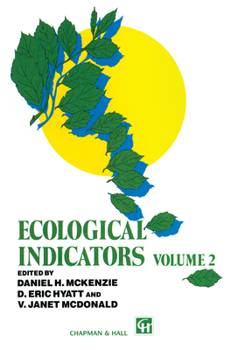Ecological Indicators: Volume 2
Select Format
Select Condition 
Book Overview
Today environmental problems of unprecedented magnitude confront planet earth. The sobering fact is that a whole range of human activities is affecting our global environment as profoundly as the billions of years of evolution that preceded our tenure on Earth. Tl: e pressure on vital natural resources in the developing world and elsewhere is intense, and the destruction of tropical forests, wildlife habitat, and other irreplaceable resources, is alarming. Climate change, ozone depletion, loss of genetic diversity, and marine pollution are critical global environmental concerns. Their cumulative impact threatens to destroy the planet's natural resources. The need to address this situation is urgent. More than at any previous moment in history, nature and ecological systems are in human hands, dependent on human efforts. The earth is an interconnected and interdependent global ecosystem, and change in one part of the system often causes unexpected change in other parts. Atmospheric, oceanic, wetland, terrestrial and other ecological systems have a finite capacity to absorb the environmental degradation caused by human behavior. The need for an environmentally sound, sustainable economy to ease this degradation is evident and urgent. Policies designed to stimulate economic development by foregoing pollution controls both destroy the long-term economy and ravage the environment. Over the years, we have sometimes drawn artificial distinctions between the health of individuals and the health of ecosystems. But in the real world, those distinctions do not exist.
Format:Paperback
Language:English
ISBN:1461371090
ISBN13:9781461371090
Release Date:November 2012
Publisher:Springer
Length:810 Pages
Customer Reviews
0 rating





